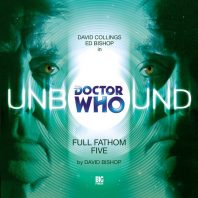
Released July 2003
The central premise of the Unbound range is that familiar characters and concepts can be explored in a wholly unique manner as novel performers step into the titular role of the Doctor. While the first two releases have been undoubted successes that have expertly highlighted what the range is capable of, David Bishop’s ‘Full Fathom Five’ boldly treads into far murkier territory with David Collings portraying a Doctor unafraid to reach an end no matter the means as he unearths his past at the Deep-Sea Energy Exploration Project that was rumoured to be taking part in unethical research and that was assumed destroyed by dirty bombs some twenty-seven years ago.
‘Full Fathom Five’ is reliant on the Doctor being a callous and self-righteous man, and Collings brings the requisite forcefulness and fortitude to the role with aplomb. It’s fair to say that portraying the Doctor in this light was always going to be a controversial move, but in the end doing so allows for a proper study of just what makes the Doctor in established continuity such a resonating and powerful force for good and endearment. As the Doctor returns to DEEP to reclaim his TARDIS after being inactive for decades, he overtly begins destroying any remaining evidence of what research was occurring here, determined to keep his promise to Ruth’s father as he blatantly tells her that her father is dead regardless of what a secret report she saw may suggest. The prospect of gaining entry into the TARDIS once more takes away all inhibitions for this morally-devoid individual, and hearing the Doctor proclaim that he does not care if an individual lives or dies and then experiencing him actually taking a life is a shocking reminder of how easily the Doctor could become a monster in his own right as a wholly different monster lurks in the shadows of the research centre.
It would be quite easy for ‘Full Fathom Five’ to focus solely on the darker and more self-centred personality of the Doctor, but Bishop also includes a very evocative setting that complements this alternative incarnation wonderfully. With a mined and dangerous seabed poisoned by the neglectful actions of Ruth’s father and a potential new source of energy gaining military interest for further study, the furtive work of DEEP behind its smokescreen was to integrate the DNA of marine life from the vicinity into human clones to create the ultimate soldier, and Ruth’s father unwittingly became his own version of success while condemned as the culprit for the vast array of horrible failures the experiments created. With Jack Galagher’s Lee unflinchingly following his own agenda, the revelation that the Doctor murdered Ruth’s father to prevent any trace of these experiments from leaving the base is shocking, with his decision to go after Ruth to ensure her own silence even more so, but it’s the brutal ending with the Doctor’s remaining lives violently taken away in quick succession that will arguably be the most haunting moment of this story filled with them by completely transforming the gift of regeneration into endless torture.
It must be stated that the DEEP plot is quite clichéd with both the experiments and supporting characters hardly fleshed out in any meaningful fashion. With occasionally shaky accents and excessive melodrama as well, this very much is a story reliant on its visual ambience and unprincipled Doctor willing to do whatever it takes. Fortunately, Collings excels in every regard from beginning to end, and though ‘Full Fathom Five’ as a whole may not be the most memorable, it absolutely contains some of the most memorable moments and one of the most memorable lead performances to date.
- Release Date: 7/2003


Leave a Reply